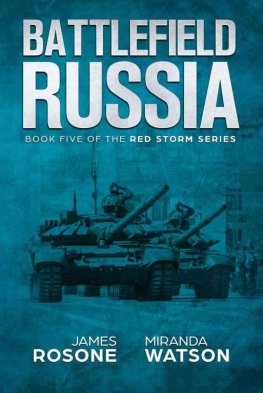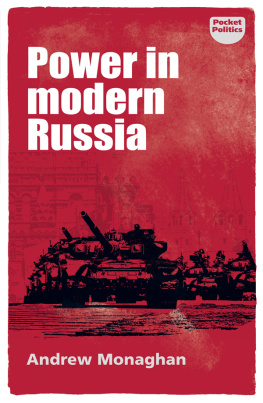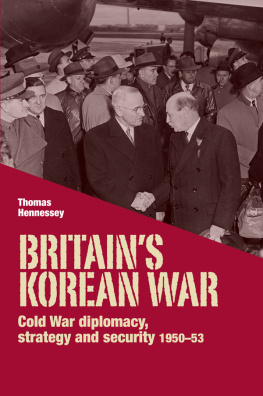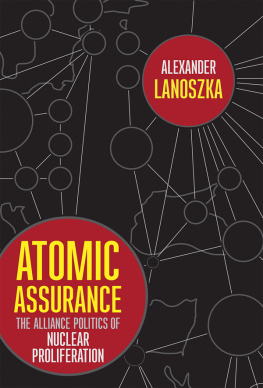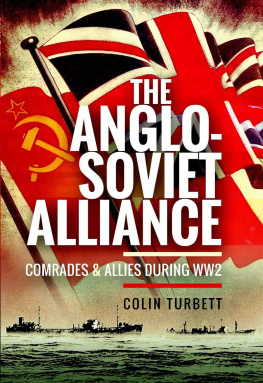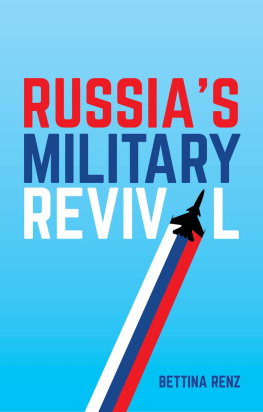ROUTLEDGE LIBRARY EDITIONS:
THE FIRST WORLD WAR
Volume 12
STRATEGY AND SUPPLY
STRATEGY AND SUPPLY
The Anglo-Russian Alliance, 191417
KEITH NEILSON
First published in 1984
This edition first published in 2014
by Routledge
2 Park Square, Milton Park, Abingdon, Oxon, OX14 4RN
and by Routledge
711 Third Avenue, New York, NY 10017
Routledge is an imprint of the Taylor & Francis Group, an informa business
1984 Keith Neilson
All rights reserved. No part of this book may be reprinted or reproduced or utilised in any form or by any electronic, mechanical, or other means, now known or hereafter invented, including photocopying and recording, or in any information storage or retrieval system, without permission in writing from the publishers.
Trademark notice: Product or corporate names may be trademarks or registered trademarks, and are used only for identification and explanation without intent to infringe.
British Library Cataloguing in Publication Data
A catalogue record for this book is available from the British Library
ISBN: 978-0-415-74924-4 (Set)
eISBN: 978-1-315-77961-4 (Set)
ISBN: 978-1-138-01665-1 (Volume 12)
eISBN: 978-1-315-78075-7 (Volume 12)
Publishers Note
The publisher has gone to great lengths to ensure the quality of this reprint but points out that some imperfections in the original copies may be apparent.
Disclaimer
The publisher has made every effort to trace copyright holders and would welcome correspondence from those they have been unable to trace.
Strategy and Supply
The Anglo-Russian Alliance, 191417
KEITH NEILSON
Royal Military College of Canada
London
GEORGE ALLEN & UNWIN
Boston Sydney
1984 Keith Neilson
This book is copyright under the Berne Convention. No reproduction without permission. All rights reserved.
George Allen & Unwin (Publishers) Ltd,
40 Museum Street, London WC1A 1LU, UK
George Allen & Unwin (Publishers) Ltd,
Park Lane, Hemel Hempstead, Herts HP2 4TE, UK
Allen & Unwin Inc.,
9 Winchester Terrace, Winchester, Mass. 01890, USA
George Allen & Unwin Australia Pty Ltd,
8 Napier Street, North Sydney, NSW 2060, Australia
First published in 1984
British Library Cataloguing in Publication Data
Neilson, Keith
Strategy and supply.
1. World War, 19141918 Diplomatic History 2. Great Britain Foreign relations Soviet Union 3. Soviet Union Foreign relations Great Britain
I. Title
940.32241 D621
ISBN 004940072X
Library of Congress Cataloging in Publication Data
Neilson, Keith.
Strategy and supply.
Bibliography: p.
Includes index.
1. World War, 19141918 Diplomatic history. 2. Great Britain Foreign relations Soviet Union. 3. Soviet Union Foreign relations Great Britain. 4. Great Britain Foreign economic relations Soviet Union. 5. Soviet Union Foreign economic relations Great Britain. 6. Great Britain Military relations Soviet Union. 7. Soviet Union Military relations Great Britain. I. Title. II. Title: Anglo-Russian alliance, 191417.
D621.G7N44 1984 940.322 8324361
ISBN 004940072X
The War lasted three years or the duration. At the beginning the Russians rendered great assistance by lending their memorable steamroller and by passing silently through England one Sunday morning before breakfast with snow on their boots.1 This comedic view of Anglo-Russian relations in the First World War has lasted long after the publication of Sellar and Yeatmans classic spoof of English history. While the Eastern front is no longer what Churchill called The Unknown War, Russias relations with Britain during the First World War have been reduced to the status of a gigantic footnote to the opening of Anglo-Soviet discourse following the close of hostilities.2 This relegation of Anglo-Russian relations to the dustbin of history is unfortunate, for it has led to an incomplete understanding both of the complexities of the war and of the events which came after it.
The principal aim of this work, then, is to remedy this deficiency by providing an account of the workings of the Anglo-Russian alliance in the period from the beginning of the war to the end of 1917. To do this has proved more difficult and complicated than it first appeared. While doing the research for this study, it became evident that the relations between Britain and Russia during the war were determined by the events of the war itself. From a British perspective, and that is the perspective of this study, the course of the alliance was determined by the amount which it was felt that Russia contributed to winning the war: Russia was judged primarily by whether or not she could provide a military presence on the Eastern front such that Allied victory would occur. Therefore, any discussion of the workings of the alliance had to take place within the context of British military strategy in the First World War. Here was the problem.
British histories of the First World War tend to see strategy in terms of two patterns.3 The first is as civilmilitary relations or, to use Major-General Sir Henry Wilsons felicitous terms, a clash between brass hats and frocks. The second is as a struggle between two strategic schools of thought, the westerners versus easterners controversy. Both of these patterns are useful for the study of war, in particular as they put the British military experience in the general context of political life in Britain. Despite this undoubted value, neither of these patterns is satisfactory for an understanding of the workings of the Anglo-Russian alliance during the war. To this end, a new view of strategy is required.
In creating this new pattern, the most obvious point which needs to be understood is that Britain did not fight alone. Instead, Britain was part of an alliance, a fact which meant that strategic decisions were made within the context of group endeavour. Here lies the weakness of the two conventional views of British strategy; both tend to view British decision-making as if the government and its advisers had the latitude of action during the war which they supposedly enjoyed in peacetime. On the contrary, considerations of France and Russia (and, later, the United States) affected nearly all aspects of Britains endeavours during the war. The decisions military, diplomatic and economic which were taken must be seen in the light of the alliance.4 For this reason, much of this study is taken up with creating a new, alliance view of British strategy, one which takes into consideration the impact of Russia and the Eastern front in particular on British planning.
A discussion of the impact of Russia on the creation of British policy has involved another problem. Just how and by whom were the decisions taken which shaped Anglo-Russian relations? With the outbreak of hostilities, the prewar bodies which served as the focus of foreign policy were gradually augmented by a number of other organisations which came to have a great impact on the determination of British policy with respect to Russia. Just as the organisational framework for dealings with Russia changed, so too did the individuals who made the decisions within the framework. Military men gained a prominence in decision-making unthinkable prior to the war. The Liberal government of Asquith was replaced by a coalition and then by Lloyd Georges amalgam. The creation of new departments of state and the exigencies of war brought new men into the corridors of power. Since the attitudes and beliefs of these men had an impact on their decisions, it has been necessary to identify those who played a major role in shaping Anglo-Russian relations and to determine what were their attitudes towards Russia.


